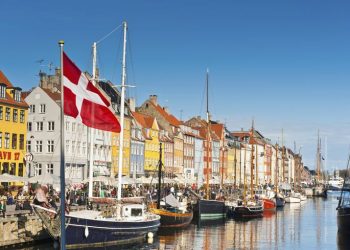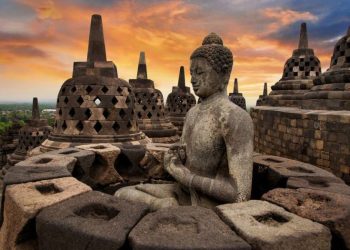Jakarta Indonesia Sentinel — During the holy month of Ramadan, Indonesia home to the world’s largest Muslim population upholds a unique traditions: waking people up for suhoor, the pre-dawn meal before fasting begins.
While eating suhoor is a sunnah (recommended but not obligatory) practice in Islam, Prophet Muhammad emphasized its blessings, making it an important part of Ramadan.
To ensure that no one misses this meal, various regions in Indonesia have developed distinct traditions to wake people up for suhoor. Here are some of the most notable ones:
Ngarak Beduk (Jakarta)
In the capital city, the traditions of waking up people for suhoor known as ngarak beduk. The tradition also called Beduk Sahur, has been practiced for generations. Historically, Betawi people used large beduk drums, mounted on carts, to travel through neighborhoods and wake people up.
Today, the procession often includes other traditional instruments like genta, rebana, and genjring, as well as fireworks and even Ondel-Ondel, the iconic Betawi effigies.
Ubrug-Ubrug (Karawang, West Java)
The ubrug-ubrug traditions of waking up suhoor in Karawang features a sinden (traditional Javanese singer) who joins musicians in parading through villages, waking people up with lively tunes. The musical ensemble includes kendang (drums), gong, guitars, and even modern instruments like keyboards.
Dengo-Dengo (Morowali, Central Sulawesi)
In Bungku, Morowali, locals build dengo-dengo, a temporary wooden structures up to 15 meters high before Ramadan. Inside, instruments like gongs, drums, and rebanas are played throughout the night. Young villagers take turns beating the instruments to remind people to wake up for suhoor.
Read Also:
Ngabuburit: Indonesia’s Ramadan Tradition of Passing Time Before Breaking the Fast
Bagarakan Sahur (South Kalimantan)
The bagarakan sahur traditions in South Kalimantan was dating back to the early days of Islam in Banjarmasin. This tradition involves using everyday household items such as pots, water jugs, and even radios to create loud noises. The goal of the traditions is quiet simple as to make enough sound to wake up the entire neighborhood.
Koko’o (Gorontalo, Sulawesi)
In Gorontalo, Koko’o tradition also known as Ketuk Sahur relies on cans, bottles, and wooden kentongan (bamboo slit drums). Groups walk through neighborhoods, rhythmically banging their instruments while singing local songs.
Regardless of their names or variations, these traditions share the same purpose: ensuring that no one misses suhoor, keeping the spirit of Ramadan alive across Indonesia.
(Raidi/Agung)
























